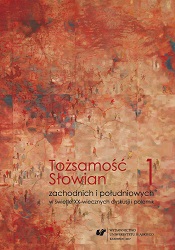Od Kultury kłamstwa do Kultury karaoke. Obraz przemian utrwalony w eseistyce
Dubravki Ugrešić
From The Culture of Lies to Karaoke Culture. The picture of changes recorded in Dubravka Ugrešic’s essays
Author(s): Anita Gostomska
Subject(s): Language and Literature Studies, Studies of Literature, Theory of Literature
Published by: Wydawnictwo Uniwersytetu Śląskiego
Keywords: Dubravka Ugrešić; essays; The Culture of Lies; Karaoke Culture; transformations; war; ex-Yugoslavia; Croatia
Summary/Abstract: Dubravka Ugrešić’s debut as an essayist happened during the time of exceptionally turbulent political transformations in Yugoslavia. Her first essays, published in foreign press,represented a spontaneous and emotional reaction to aggressive nationalism, which in the 1990s had dominated the public discourse in Croatia. The change of narration coincidedwith writer’s departure from the country; the difficult farewell with her homeland turned out to be the beginning of a completely new life and a different way of expression. The essays are based on her private history in the first place and the consequences of the disintegration of Yugoslavia constitute a constant point of reference. The writer, using her literature as a weapon, ruthlessly reviews the common past and presence for more than twenty years; she also devotes a great deal of attention to the cultural phenome which follow the global era, and she keeps the same critcal distance to them. By the undoubtedly intentional similarity of the titles (The Culture of Lies and Karaoke Culture) the writer expresses her subjective opinion, based on her personal experience, about the twenty-year-old process of changes. In this opinion the lie and karaoke with their symbolic meaning are not significantly different, and the changes turn out illusory. Ugrešić presents the timelessness of phenomena, to which as a writer she feels obliged to stand up, although the intensity of her faith in the power of literature seems to be weakened permanently. This utopian revolt, which comes from permanent criticism, strengthened by self-mockery, is a mark of Ugrešić’s writnig in the last two decades.
- Page Range: 155-171
- Page Count: 17
- Publication Year: 2017
- Language: Polish
- Content File-PDF

